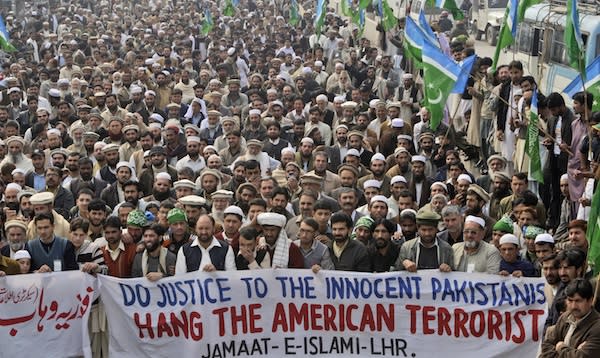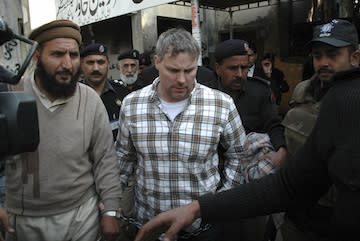 The Cutline
The CutlineU.S. news outlets held back disclosing Davis’ CIA ties

The New York Times, Washington Post, and Associated Press reported Monday that Raymond Davis—an American who shot two men in Pakistan last month—was working for the CIA at the time. And while reporting that news, all three outlets revealed something else: They had been holding back that information at the U.S. government's request.
But the government dropped its request after a British paper broke the news a day earlier. That meant the lead editors at U.S. news organizations could go forward with their own Davis stories. The Guardian reported Sunday that Davis was on assignment for the CIA at the time of the fatal shooting, which he claims arose out of his effort to defend himself during a robbery attempt. The Guardian also revealed in the article that "a number of US media outlets" knew about Davis' CIA ties "but have kept it under wraps at the request of the Obama administration."
Ian Katz, deputy editor of The Guardian, told The Cutline that "similar representations were made to the Guardian to those received by U.S. media." But unlike its U.S. counterparts, The Guardian went ahead with the story.
Katz noted that two senior Pakistan government sources officially confirmed that Davis was a CIA operative and explained in an email why it was relevant to report.
"We believe Davis's role in Pakistan is unavoidably connected with both the legal case surrounding him and with the U.S. government's attempts to seek his release," Katz said. "And since Davis is already widely assumed in Pakistan to have links to U.S. intelligence, we did not accept that disclosing his CIA role would expose him to increased risk."
Would outing Davis as an agent have increased potential risks to his life? Perhaps. But the shooting had already sparked a diplomatic crisis, with Pakistani protesters calling for violent retribution against Davis and burning American flags and an effigy of the CIA agent on the street. (The protest against Davis pictured above took place a week ago). And in the Pakistani media—where conspiracy theories involving the CIA are commonplace—Davis had already been pegged as a spy.
Meanwhile, U.S. government officials have been describing Davis—a 36-year-old former Special Forces soldier—as a consulate employee who should be granted diplomatic immunity. President Obama referred to Davis last week as "our diplomat," while Massachusetts Democratic Sen. John Kerry traveled to Pakistan to press for Davis' release.

It's now clear that officials were urging news organizations to refrain from reporting that Davis was working for the CIA at the time of the shooting---and observers worry news of this collusion could appear to confirm widely held suspicions that the Pakistani government gives the CIA free rein in the country. News organizations are also now reporting that Davis worked for Blackwater, the controversial military contractor that now goes by the name Xe Services.
Katz said he wasn't surprised that news organizations across the pond held back. "We can appreciate why U.S. media outlets may have felt under greater pressure not to run the story," he said.
All three news organizations explained their reasoning for keeping the CIA relationship under wraps in their Monday reports.
The New York Times stated that it "had agreed to temporarily withhold information" about Davis' CIA ties at the Obama administration's request, after officials "argued that disclosure of his specific job would put his life at risk." The Washington Post and AP also cited risks to Davis' life as the primary reason for withholding the information.
But the AP added a few more details in its disclosure. The news organization noted that it found out Davis was working for the CIA "immediately after the shootings" and stated that it had "intended to report Davis' CIA employment after he was out of harm's way, but the story was broken Sunday by The Guardian."
Salon's Glenn Greenwald didn't buy such reasoning. On Monday, Greenwald blasted the New York Times for helping the government conceal information and only reporting the facts after the paper had won the government's "permission" (and because The Guardian already got the scoop).
"It's one thing for a newspaper to withhold information because they believe its disclosure would endanger lives," Greenwald wrote. "But here, the U.S. Government has spent weeks making public statements that were misleading in the extreme—Obama's calling Davis 'our diplomat in Pakistan'—while the NYT deliberately concealed facts undermining those government claims because government officials told them to do so. That's called being an active enabler of government propaganda."
Since the Jan. 27 shooting, these news organizations have been covering Davis' ordeal—the Times even describing the "mystery" about his duties and speculation in the Pakistani press that contradicted statements from the U.S. government—while holding back a vital piece of information about his role in the country.
If the government is making statements about Davis' role in Pakistan, wouldn't news organizations have an obligation to refute such claims--or provide important context--if they had the goods? Under normal circumstances, yes. But when the government argues that someone's life could be on the line, editors may pause before publishing.
"We knew early on. We held back because [the] government said it would endanger his life," Dean Baquet, Washington bureau chief of the New York Times, told The Cutline in an email. "I think they will still make the immunity argument, so not sure his job would change that. We kept reporting as our story shows. We never decided exactly when we would write of his real job. We took it day by day."
The Cutline also reached out to the Washington Post and AP.
Cameron Barr, national security editor for the Washington Post, said he had "no comment beyond what we say in the story." An AP spokesman did not immediately provide a response.
(Photo of Pakistani religious party Jamat-e-Islami at a rally against Raymond Davis on Feb. 15, 2011: K.M. Chaudary, File. Photo of Davis at a local court in Lahore Pakistan on Jan. 28: AP /Hamza Ahmed, File)
